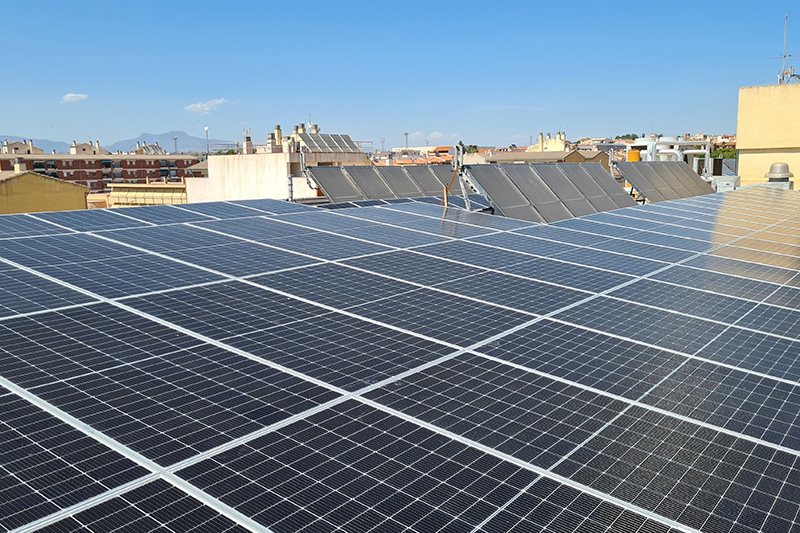- On World Environment Day, the group highlights the value of environmental certifications and policies that contribute to the sustainable development of an essential and essential activity such as health care
- Environmental protection and pollution prevention are allied to the responsible health policy pursued in its twelve hospitals, 35 polyclinics and 64 primary care centres.
For more than 25 years, the Ribera healthcare group has been developing policies that contribute to the sustainable development of its activity. Linked to its responsible health policy, the group is committed to protecting the environment and preventing pollution, aware that its commitment also has a positive impact on the health and well-being of the citizens of the areas in which it operates. In fact, the group’s 2022 Sustainability Report, which will be published shortly, highlights the fact that 84% of the energy consumed in its twelve hospitals, 64 primary care centres and 35 polyclinics of the Ribera healthcare group is of renewable origin.
In the context of World Environment Day, the Ribera Group wanted to highlight some of the most important environmental indicators of its activity. World Environment Day is the world’s largest global platform for environmental awareness and is celebrated by millions of people around the world, led by the United Nations Environment Programme (UNEP) and celebrated every 5 June since 1973. This year the UN is making an urgent call to “keep global warming below 1.5 degrees Celsius this century by halving annual greenhouse gas emissions by 2030”. If we don’t act now, he says, “exposure to polluted air will increase by 50% in this decade”. “Time is running out and nature is in a state of emergency,” says this year’s campaign, a video of which can be seen here.
The Ribera healthcare group holds numerous environmental certifications and has a corporate Environmental Policy that applies to all its activities. The management of energy, waste and development, as well as the constant monitoring of the results of the climate strategy are some of the pillars on which the environmental policy pivots. In addition to the certifications obtained in previous years, which are renewed annually, in 2022 the Hospital Universitario del Vinalopó will receive ISO 14001 certification for its Environmental Management Systems, and the hospitals of Denia, Ribera Hospital de Molina (Murcia) and Ribera Juan Cardona (Ferrol) will receive Carbon Footprint certification.
Over the years, Ribera has taken appropriate measures to protect and improve the environment and minimise its environmental impact, where necessary, by complying with the relevant regulations in force. In addition, during 2022, it has developed action plans focused on expanding the number of hospitals with a certified carbon footprint; registering the carbon footprint with the Ministry of Ecological Transition and the Demographic Challenge; continuing to reduce the use of plastic; training professionals in good environmental practices, with special emphasis on the correct segregation of waste; and raising awareness of the sustainable use of resources.
The healthcare group allocates almost one million euros to the prevention of environmental risks. In addition, the group highlights that the Vinalopó Hospital has four Joint Commission International accreditations (Enterprise, Coronary Bypass Surgery Programme, Vinalopó Health Department and Hospital) and the Ribera Povisa hospital has also been accredited by the Joint Commission International. This is the most prestigious health accreditation that allows these hospitals of the group to be among the best centres in the world. In fact, one of the key aspects to obtain it is to accredit good risk management, in particular the environmental part of the management.
The group has waste management plans that aim to disclose information on the type, location, identification, storage conditions, safe use and disposal of hospital materials and waste, each according to its classification. Seventy-seven per cent of the waste generated by the group is categorised as “non-hazardous”.
Reducing food waste, energy and water consumption
Management to reduce food waste is another of the cornerstones of the group’s environmental policy. For example, at the Ribera Juan Cardona Hospital, they are committed to halving food waste through the Stop Food Waste programme, and the Torrejón Hospital has a protocol against food waste, as a result of which it has managed to reduce it by 49% compared to 2021. At Ribera Povisa Hospital, for example, they prioritise the purchase of single-dose products, so that the waste in the preparation of meals is minimal.
With regard to the group’s energy consumption, in 2022 it has been reduced by 15% compared to the previous year. In addition, Ribera continues to be committed to renewable energy generation and to purchasing from renewable energy suppliers. These measures aim to reduce the group’s carbon footprint through the use and production of renewable energy. During the past year, the Ribera Polusa Hospital and the Santo Domingo Clinic, the Ribera Povisa and Ribera Juan Cardona hospitals and the Denia Health Department have joined the use of renewable electricity. Together with Torrejón Hospital, Vinalopó and its health centres and Ribera Hospital de Molina, the Group has purchased 34,413.63 mWh of electricity from 100% renewable sources, which represents 84% of the total electricity purchased this year.
With regard to the renewable energy produced, the Ribera healthcare group has solar panels at the Vinalopó, Torrejón, Juan Cardona and Molina del Segura Hospitals. In addition, the Molina del Segura Hospital has solar thermal energy, which, together with photovoltaic energy, represents an increase in the consumption of energy from renewable sources. These panels are used for hot water consumption and electricity generation, achieving energy savings in the production of hot water.
Another fact that confirms the commitment to reducing the use of scarce resources is the lower water consumption recorded in 2022 compared to 2021. Always guaranteeing the safety of patients, the group is committed to raising awareness among the public and the professionals themselves for a sustainable use of these resources. And with these policies and awareness campaigns, in just one year the cubic metres consumed have been reduced by 36,600.


Recent Comments